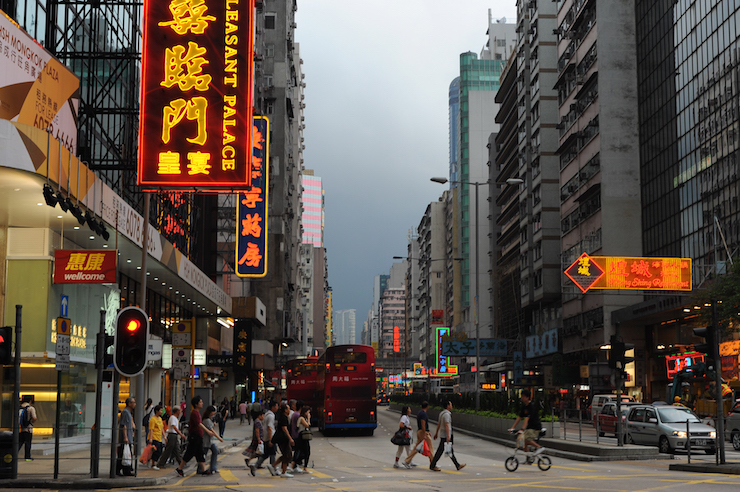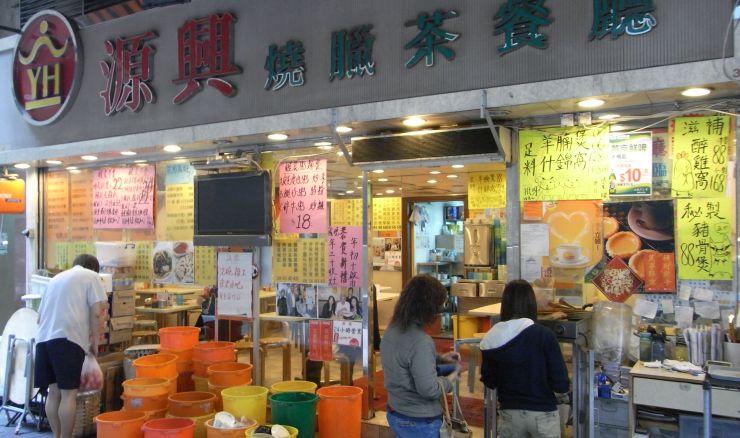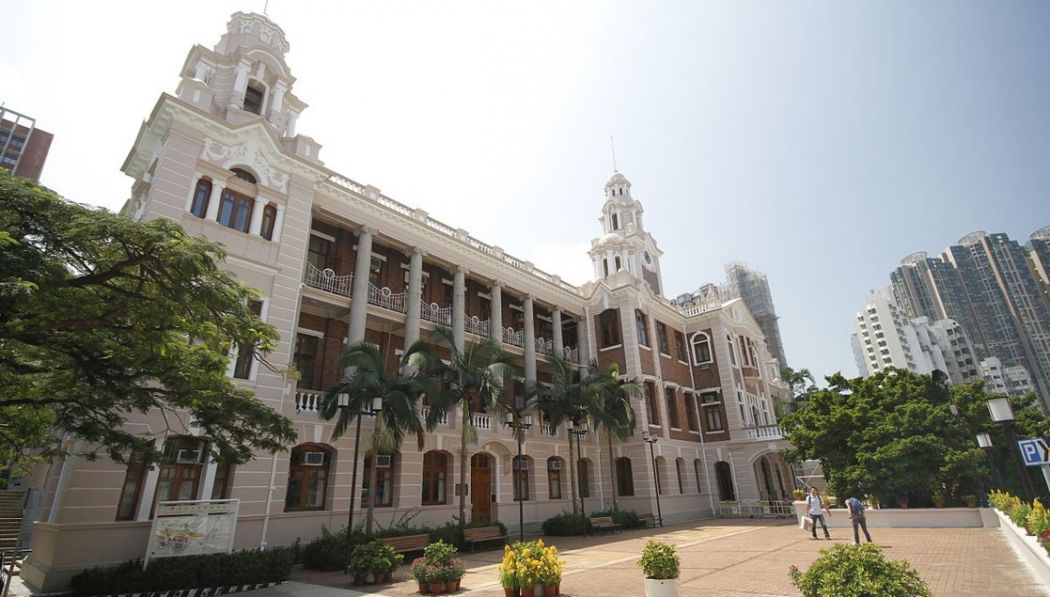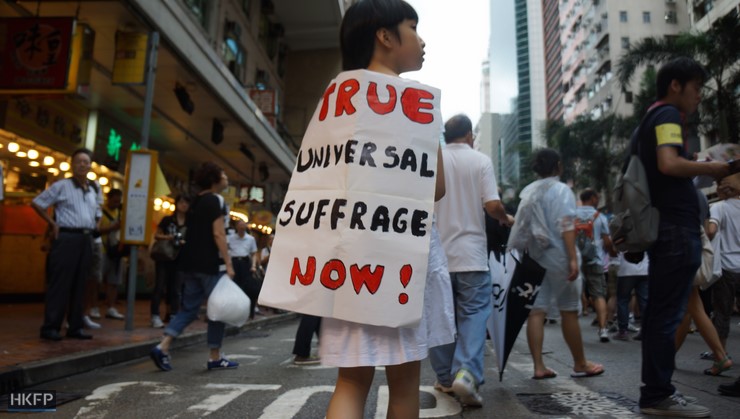By Andrew S Guthrie
Language is a matter of habit. If one doesn’t inhabit a certain domicile, let alone nation, one can not easily learn the language. Under these terms segregation is guaranteed; to a certain degree one must segregate in order to become fully immersed in any language.
Any opening in which the speakers can revert to their native tongue tends to dilute this immersion. There are enclaves all over the world that exclusively utilize a non-native language; these might be a colonial or economic zone, or simply a place where rent is affordable for the newly arrived immigrant.

Hong Kong’s primary language – Cantonese, is spoken by 89.5% of the overall population; a distinct Cantonese which marks Hong Kong identity as much as a surname or ethnicity. The city is supposedly tri-lingual, though the other two languages can practically be classed as “official”, as in who runs the banks, the city government, the universities, and as such both languages and cultures, English and Putonghua, are burdened by this historicity.
This would seem to position Cantonese as a kind of oppositional language to the minority but highly influential positions of the two historical colonizers of Hong Kong. Most recently, Beijing has tried to directly discourage use of Cantonese in Hong Kong and Guangdong and it’s easy to note, in my ten years residency in Hong Kong, the increased use of Putonghua.
I began by qualifying how one absorbs a language, or reaches any degree of fluency, with reference to the usually pejorative term “segregation”. This is the state of affairs for most native English speaking foreign-born people in Hong Kong (including myself).
Through ingrained habits (where one works, where one socializes) and by squeezing the most out of the years and years of the English language education of the Cantonese-speaking Hong Konger, the native-English speaker is able to slide by with the most minimal comprehension of what the other 89.5% of the city are speaking on a regular basis.

In my experience it’s easy enough to come across foreigners who have been in Hong Kong twice as long as myself who also have a weaker comprehension of Cantonese. There are all kinds of excuses for this (which I will go into) but any extenuating circumstance must ultimately default to Hong Kong’s colonial past, to its legacy as a British colony.
Therefore, all of us native English speakers in Hong Kong must share this inherent guilt (that is, if you classify yourself as an anti-colonialist thinker). On the other hand, there has been no linguistic initiative that addresses this shortcoming in terms of contemporary progressive politics. In fact, when I have attempted to learn Cantonese I have been repeatedly advised (by “locals”) to switch to the “easier” (less tones/modernized) Putonghua.
I have resisted this for two reasons – one practical and one ideological. The practical one being Cantonese is “the language of the streets”. If I want to take a taxi somewhere, buy groceries at a wet market, order a meal in a cha chaan teng (see, I’m already speaking Cantonese!) then I would need to know some Cantonese.
The ideological reason should be easy enough to deduce – Cantonese is one of the major distinctions between Hong Kong and Mainland China. In this way it can be positioned as a language of resistance.

Some of the excuses for not advancing beyond beginner Cantonese, is that the language (and learning it) have not been standardized; there is a plethora of alternate Anglicized spellings and I have yet to come across a comprehensive and well-organized Cantonese/English dictionary.
Added to this pinyin conundrum is that I am unable to read Chinese characters so I don’t have the advantage I would have learning any phonetic European language (the ability to read any form of Chinese is a decidedly big step amongst most non-native learners).
These are some of the most common excuses and at times will be greeted sympathetically by the native-born Hong Konger. But make no mistake about it, there is a deep-seated resentment towards the long term non-native resident who knows no or very little Cantonese, though this seething undercurrent can be at times quite passive-aggressive.
A non-Cantonese speaking employee can find themselves wedged into a majority Cantonese meeting or party that simply refuses to default to any English (sometime for hours on end). Or the Cantonese speaking street level employee wants to practice their English on you (defaults to English) which for the most part is a rare opportunity in their day-to-day.

To flip the equation, English is required for most university level papers or presentations but usually demonstrates a comprehension that is far from fluent.
These conditions are what I mean by “passive-aggressive”. The decision or impetus to use one language or the other is left up in the air.
In Hong Kong one might also consider English as a language of resistance and would seem to be integral to promoting Hong Kong self-determination or democratic ambitions to a wider global audience. I consider English language news and opinion generated by the Hong Kong opposition as a key element in the specifics of Hong Kong pro-democracy movement.
But perhaps this strategy can also require a remedial Cantonese, one that integrates the foreigner more firmly into the struggle for universal suffrage, or more simply, into the vagaries of “local culture”.
I am always playing catch-up with local Chinese language news stories, incidents in Hong Kong or China that are visually broadcast by local “friends” on Facebook. I usually catch up, but I am also out of the loop.

Occasionally I tease someone, a Cantonese stranger on the street when they ask me where I am from. Seeing as I have lived here for ten years I sometimes answer “Ngoh hai hong kong yan”. The inevitable follow-up is, “You speak Cantonese?” – “Siu siu” (pinching my thumb and forefinger together).
One of the best answers I ever received from someone when I asked, “How will I know when I am a Hong Kong person (or a person from Hong Kong)?” was, “When you know the slang…” Well, I know a little Cantonese slang, but not enough.
Andrew S Guthrie was born in New York City, lived for most of his life in Boston, moved to Hong Kong in 2005. His book of poetry “Alphabet” was released in April 2015 through Proverse Publishing Hong Kong, and his cultural history “Paul’s Records” was released through Blacksmith Books in October 2015.
